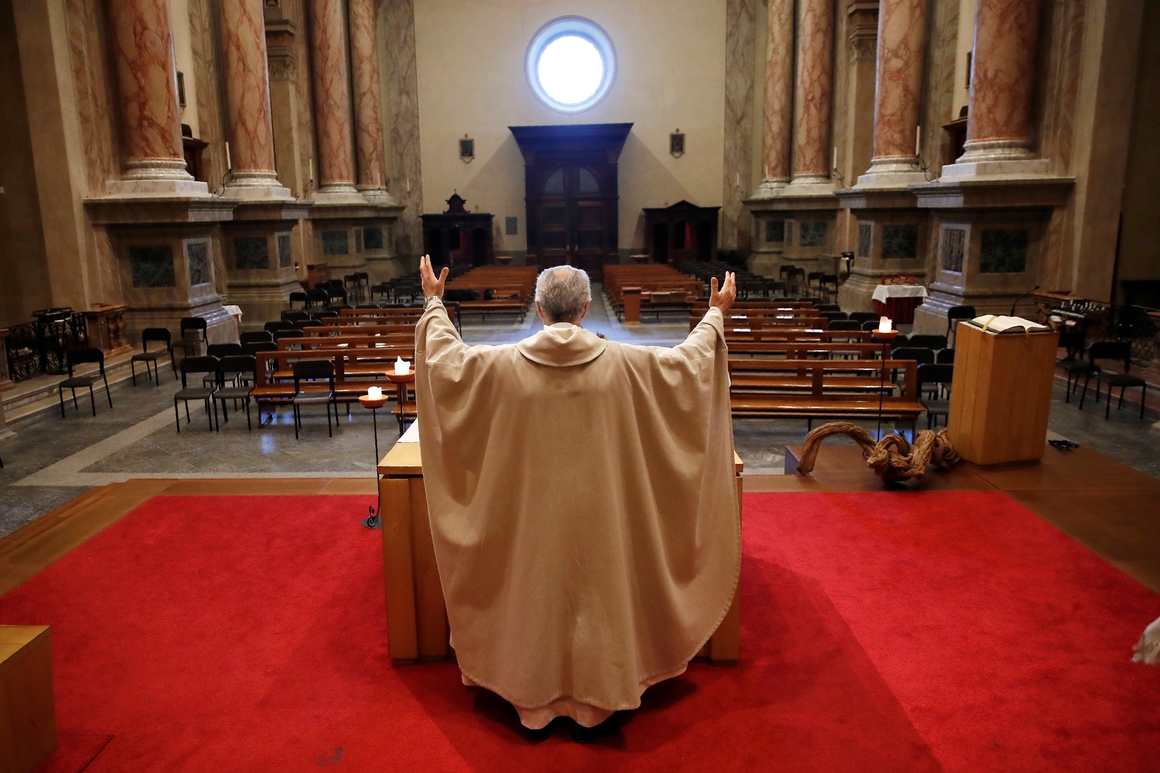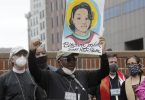
When the lockdown started, most priests quietly accepted the need to suspend services and found alternative ways to connect with their flocks, holding ceremonies by video or taking Confession by the roadside. But now that other places are gradually reopening, the clergy don’t see why they should be last on the list.
„I have the impression that faith is considered as a personal matter. Going to Mass is prohibited just like having dinner with friends,“ said Don Giacomo, a priest in a small town in Lombardy, Northern Italy.
Conte can’t be accused of being anti-religion. He taught law at one of Rome’s Catholic universities (LUMSA) and has made no secret of being very religious. During one of his first TV appearances as prime minister, when most Italians didn’t know who he was, he revealed that he always keeps in his pocket a prayer card of Padre Pio, a venerated figure among Catholics in Italy.
Yet Conte’s announcement on Sunday came as a disappointing surprise to Catholic bishops, who had been expecting a progressive relaxation of the ban on celebrating Mass. They had been holding talks with the government and came up with proposals that would, in their view, enable churches to reopen while ensuring social distancing and public health.
„Italian bishops can’t accept to see the exercise of religious freedom compromised,“ the Italian Episcopal Conference wrote in a statement minutes after Conte’s decree.
The bishops accused the government of „arbitrarily“ depriving priests and citizens of their liturgical rights and demanded respect from the state for the autonomy of the church.
The government in Rome quickly promised to work on measures to allow religious services to resume as soon as possible, and the prime minister offered assurances that he wasn’t following a „materialist approach.“ However, Conte insisted the expert committee advising the government had been particularly „rigid“ in its recommendation to maintain the ban for places of worship.
Scientific studies and statistics have shown that religious gatherings played a major role in spreading the pandemic, Conte said. It is in priests’ interest to wait and have clear rules to guarantee public health in churches, he added.
Pope Francis tried to pour oil on troubled waters in a sermon on Tuesday, in which he invited Christians to be obedient and to respect restrictions.
But the priests’ protests have already gathered momentum, and risen in temperature, across Europe.
In Greece, the Orthodox Archbishop Ieronymos II of Athens sent a letter to Prime Minister Kyriakos Mitsotakis, urging him to reopen churches.
But the Greek prime minister didn’t include religious services in the first round of reopenings scheduled for May 4. Mass and other religious services will only be permitted from May 17, he said, leading to criticism from high-ranking Orthodox prelates.
“I have to admit the government decisions were not that satisfactory,“ Metropolitan Chrysostomos of Messinia told local TV.
In France, the episcopal conference called for a reopening of churches from May 11, something that was also asked for by 130 priests in an open letter to President Emmanuel Macron published in Le Figaro.
However, Prime Minister Édouard Philippe didn’t grant their request and announced that religious services would be forbidden until June 2, leading to criticism from lawmakers from the governing coalition.
„Banning religious services while shops are reopening … is an incomprehensible decision,“ the head of Les Républicains in the Senate Bruno Retailleau wrote in a tweet.
In some instances, police have entered places of worship to enforce the lockdown and interrupted ceremonies taking place with or without congregants physically present.
When police tried to stop a Sunday Mass in the small village of Gallignano in northern Italy, the priest refused to interrupt the service. The scene was recorded in a video released by Italian media.
The priest, don Lino Viola, was fined €680. „I won’t pay [and] I will appeal against the decision,“ he told local newspaper La Provincia.
Church authorities offered him strong support, with Cardinal Angelo Becciu writing in a tweet that „no authority has the right to interrupt a Mass,“ and inviting police to wait for the end of the service before intervening.
In France, three armed police officers forced their way into a Parisian church during a Mass being streamed online and made the priest stop the service. Under French law, police have no right to enter a church without authorization. „It was a breach of the law, there’s no doubt about this,“ the priest, Philippe de Maistre, told Valeurs Actuelles.
In Germany, police broke up a Mass attended by up to 50 worshippers in Hannover, according to a report in local newspaper Neue Presse.
It’s all a far cry from the early phase of the lockdown, when churches generally accepted the need to close their doors temporarily and only a few opposition parties attempted to stir up protest. They included Matteo Salvini, leader of Italy’s far-right League, who was an advocate of reopening churches over Easter; at the time, it was the Italian Episcopal Conference that cautioned against this, saying public health was the priority.
Now, even some lawmakers from Italy’s governing Democratic Party are in favor of relaxing the ban on celebrating Mass.
„If we are entering a new phase … it is not reasonable to maintain the same restrictions we had in the previous one,“ said Stefano Ceccanti, a member of the Italian parliament from the Democratic Party, adding that the government had not managed to strike the right balance between safeguarding public health and guaranteeing religious freedom.
Ceccanti has proposed an amendment to Conte’s decree that would allow for religious bodies and the government to jointly plan for the reopening of places of worship.
Just such a process is going on in Germany where, following a dialogue between religious bodies and the interior ministry, there should be a decision on the possible reopening of churches this Thursday, according to a spokesperson for Angela Merkel’s Cabinet.
The German Catholic bishops’ conference has made several proposals on how to hold services while maintaining safety measures in a paper that was discussed with officials from the interior ministry last week.
Johannes zu Eltz, dean of the Roman Catholic Church of Frankfurt, believes religious services should never have been interrupted in the first place. He argues that it is easier to ensure social distancing in a church than in shops, some of which have now reopened.
„People’s behavior is static — you’re not walking up and down the aisles like in a DIY store. You’ve got to imagine a dull German service where people try to sit three meters apart anyway, rather than some ecstatic, charismatic session of worship,“ he said.
The Frankfurt dean went further, arguing that Mass should be considered an essential service, as the „spiritual empowerment of Christians to engage in society“ and something beyond the remit of the state.
His Italian colleague don Giacomo also argued that church services provide the impetus for charitable efforts which can play a vital role in such difficult times. He has been streaming Mass online since the start of the lockdown in Lombardy, and has seen his weekday congregation swell from 20 worshippers in normal times to about 250 people.
Don Giacomo maintains, however, that the continued ban is a source of suffering, and that it „reflects the way in which governments and public opinion conceive faith … as a personal matter of no use to the community.“
America Hernandez, Laurenz Gehrke, Nektaria Stamouli and Elisa Braun contributed reporting.
Source: politico.com
See more here: news365.stream





